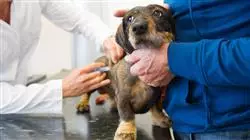University certificate
The world's largest faculty of veterinary medicine”
Introduction to the Program
This Postgraduate certificate is organized so as to allow for logical and intuitive in-depth study as well as the consolidation of diagnostic, therapeutic and follow-up protocols"

Genitourinary pathologies are a series of ailments that occur frequently in the small animal clinic, and apart from being easily recognizable by the clinician, they also present evident symptoms to patients’ owners.
The fact that they frequently appear does not indicate that their diagnosis and treatment are simple, since their etiology is wide-ranging.
It is therefore of vital importance to know the pathogenesis, the correct choice of a diagnosis, correct therapeutic guidelines and the adequate follow-up, so that the patients suffering from it benefit from a correct approach.
The topics covered in this program have been selected to offer complete, up-to-date and quality specialization in internal medicine, thereby providing students with knowledge that will allow them to safely deal with cases and carry out adequate follow-up, monitoring and therapeutic procedures.
The teaching staff in this program is made up of specialists from within different areas of internal medicine with extensive clinical experience. These faculty members have received accreditation as specialists in different fields such as cardiology, ophthalmology, diagnostic imaging, dermatology and oncology, and have frequently collaborated together in veterinary specialty centers.
In addition to providing quality clinical work, some of these experts actively participate in various research projects parallel to their teaching and clinical activities.
Upon completion of the program, students will have obtained knowledge that is essential for professional practice, whether they choose to exercise in a clinical, academic or research context"
This Postgraduate certificate in Genitourinary System Disorders in Small Animals contains the most complete and up-to-date educational program on the market. Its most important features include:
- Case studies presented by experts in Genitourinary System Disorders in Small Animals
- The graphic, schematic, and practical contents with which they are created provide scientific and practical information on the disciplines, essential for professional development
- Latest information on Genitourinary System Disorders in Small Animals
- Practical exercises where self-assessment can be used to improve learning
- Special emphasis on innovative methodologies in Genitourinary System Disorders in Small Animals
- Theoretical lessons, questions to the expert, debate forums on controversial topics, and individual reflection assignments
- Content that is accessible from any fixed or portable device with an Internet connection
Each chapter is accompanied by clinical cases that aim to incorporate the knowledge conveyed and includes activities that will allow students to assess their progress"
Its teaching staff includes professionals in veterinary medicine who bring the experience of their work to this program, in addition to recognized specialists from leading societies and prestigious universities.
The multimedia content, developed with the latest educational technology, will provide the professional with situated and contextual learning, i.e., a simulated environment that will provide immersive learning programmed to train in real situations.
The design of this program is based on Problem-Based Learning, through which specialists must try to solve the different situations of professional practice that arise throughout the program. For this, professionals will have the help of an innovative interactive video system created by recognized experts in Genitourinary System Disorders in Small Animals.
You will learn to recognize pathologies associated with urinary and reproductive systems quickly and effectively”

A high-level program through which you will achieve professional success”
Why study at TECH?
TECH is the world’s largest online university. With an impressive catalog of more than 14,000 university programs available in 11 languages, it is positioned as a leader in employability, with a 99% job placement rate. In addition, it relies on an enormous faculty of more than 6,000 professors of the highest international renown.

Study at the world's largest online university and guarantee your professional success. The future starts at TECH”
The world’s best online university according to FORBES
The prestigious Forbes magazine, specialized in business and finance, has highlighted TECH as “the world's best online university” This is what they have recently stated in an article in their digital edition in which they echo the success story of this institution, “thanks to the academic offer it provides, the selection of its teaching staff, and an innovative learning method aimed at educating the professionals of the future”
A revolutionary study method, a cutting-edge faculty and a practical focus: the key to TECH's success.
The most complete study plans on the university scene
TECH offers the most complete study plans on the university scene, with syllabuses that cover fundamental concepts and, at the same time, the main scientific advances in their specific scientific areas. In addition, these programs are continuously being updated to guarantee students the academic vanguard and the most in-demand professional skills. In this way, the university's qualifications provide its graduates with a significant advantage to propel their careers to success.
TECH offers the most comprehensive and intensive study plans on the current university scene.
A world-class teaching staff
TECH's teaching staff is made up of more than 6,000 professors with the highest international recognition. Professors, researchers and top executives of multinational companies, including Isaiah Covington, performance coach of the Boston Celtics; Magda Romanska, principal investigator at Harvard MetaLAB; Ignacio Wistumba, chairman of the department of translational molecular pathology at MD Anderson Cancer Center; and D.W. Pine, creative director of TIME magazine, among others.
Internationally renowned experts, specialized in different branches of Health, Technology, Communication and Business, form part of the TECH faculty.
A unique learning method
TECH is the first university to use Relearning in all its programs. It is the best online learning methodology, accredited with international teaching quality certifications, provided by prestigious educational agencies. In addition, this disruptive educational model is complemented with the “Case Method”, thereby setting up a unique online teaching strategy. Innovative teaching resources are also implemented, including detailed videos, infographics and interactive summaries.
TECH combines Relearning and the Case Method in all its university programs to guarantee excellent theoretical and practical learning, studying whenever and wherever you want.
The world's largest online university
TECH is the world’s largest online university. We are the largest educational institution, with the best and widest online educational catalog, one hundred percent online and covering the vast majority of areas of knowledge. We offer a large selection of our own degrees and accredited online undergraduate and postgraduate degrees. In total, more than 14,000 university degrees, in eleven different languages, make us the largest educational largest in the world.
TECH has the world's most extensive catalog of academic and official programs, available in more than 11 languages.
Google Premier Partner
The American technology giant has awarded TECH the Google Google Premier Partner badge. This award, which is only available to 3% of the world's companies, highlights the efficient, flexible and tailored experience that this university provides to students. The recognition as a Google Premier Partner not only accredits the maximum rigor, performance and investment in TECH's digital infrastructures, but also places this university as one of the world's leading technology companies.
Google has positioned TECH in the top 3% of the world's most important technology companies by awarding it its Google Premier Partner badge.
The official online university of the NBA
TECH is the official online university of the NBA. Thanks to our agreement with the biggest league in basketball, we offer our students exclusive university programs, as well as a wide variety of educational resources focused on the business of the league and other areas of the sports industry. Each program is made up of a uniquely designed syllabus and features exceptional guest hosts: professionals with a distinguished sports background who will offer their expertise on the most relevant topics.
TECH has been selected by the NBA, the world's top basketball league, as its official online university.
The top-rated university by its students
Students have positioned TECH as the world's top-rated university on the main review websites, with a highest rating of 4.9 out of 5, obtained from more than 1,000 reviews. These results consolidate TECH as the benchmark university institution at an international level, reflecting the excellence and positive impact of its educational model.” reflecting the excellence and positive impact of its educational model.”
TECH is the world’s top-rated university by its students.
Leaders in employability
TECH has managed to become the leading university in employability. 99% of its students obtain jobs in the academic field they have studied, within one year of completing any of the university's programs. A similar number achieve immediate career enhancement. All this thanks to a study methodology that bases its effectiveness on the acquisition of practical skills, which are absolutely necessary for professional development.
99% of TECH graduates find a job within a year of completing their studies.
Postgraduate Certificate in disorders of the genitourinary system in small animals
.
This Postgraduate Certificate in Alterations of the Genitourinary System in Small Animals offers a complete and updated specialization in internal medicine for those veterinary professionals who wish to deepen in the diagnosis and treatment of genitourinary pathologies in small animals. The program has been designed to comprehensively and rigorously address all pathologies related to the genitourinary system, from their etiology to their diagnosis and treatment. The topics presented have been carefully selected to offer quality and comprehensive training, allowing the student to acquire the necessary knowledge to approach cases safely and effectively.
Specialize in Internal Medicine for Veterinarians
.
The teaching staff that teaches this program is made up of specialists in the different areas of internal medicine, with extensive experience in the clinical practice of this specialty. In addition, they hold accreditations as specialists in different fields, such as cardiology, ophthalmology, diagnostic imaging, dermatology and oncology, which allows them to work together in a veterinary specialty center. This Postgraduate Certificate has quality didactic material, including video summaries, complementary readings and real clinical cases, which allow the student to acquire an updated and visual teaching, pleasant and agile. In addition, as it is an online program, the student is not conditioned by fixed schedules or the need to move to another physical location, but can access the contents at any time of the day, balancing their work or personal life with their academic life. In short, this Postgraduate Certificate in Alterations of the Genitourinary System in Small Animals is a unique opportunity for those veterinary professionals who wish to specialize in internal medicine, deepening in the diagnosis and treatment of genitourinary pathologies in small animals and offering a quality service to their patients.







